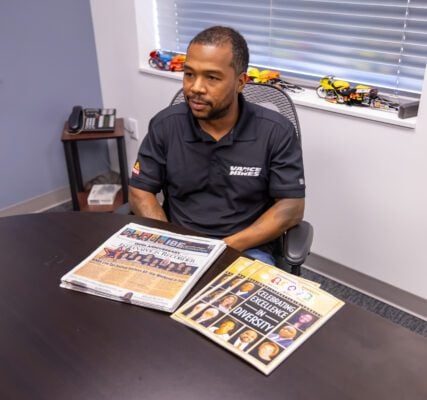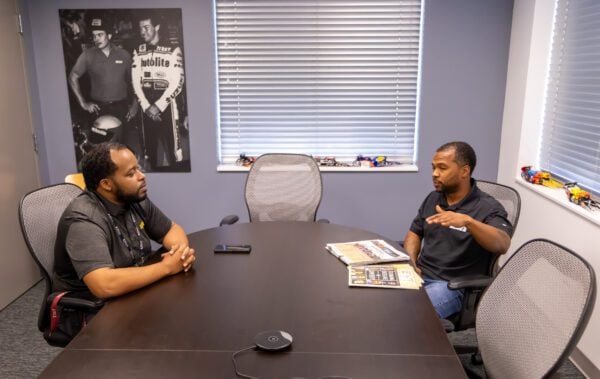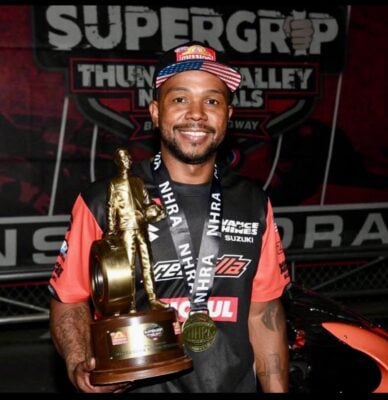When Richard Gadson finally gripped the Wally trophy at the NHRA Thunder Valley Nationals — the most prestigious prize in drag racing — his first feeling wasn’t triumph, but profound relief.
“The relief of chasing something for as long as you can remember,” Gadson told the Indianapolis Recorder. “Like something is in your hand, chasing it that long … it is a tremendous weight off of your shoulders. You feel like you’ve just lost 20 or 30 pounds.”
For Gadson, only the fourth African American to win in the ultra-competitive Pro Stock Motorcycle (PSM) class (Antron Brown, Peggy Llewelyn, Michael Phillips), the moment symbolized far more than a career milestone. It represented the culmination of a 20-year odyssey fueled by family sacrifice, unwavering authenticity and a relentless drive to shatter barriers in a sport where diversity remains scarce.
Gadson’s journey began not on a professional track, but in the basement of his grandmother’s Philadelphia home. His earliest memory, etched at age 4, revolves around a forbidden fascination.
“My father had a little motorcycle that they used to call a pocket rocket,” Gadson said. “I kept sneaking down in the basement to sit on it, pretending to ride a motorcycle.”
His father passed away when he was six, but an uncle honored a promise to keep him immersed in racing. “He took me all over the country … Pretty much my whole childhood,” Gadson recalled. The deal? Academic excellence. “I had to get good grades … good, I could go racing.”
His uncle? The legendary motorcycle drag racer Rickey Gadson, who broke down barriers and shattered records before Richard could even drive.
Despite excelling academically — graduating from Philadelphia’s Masterman School before studying mechanical engineering — Gadson’s passion remained fixed on motorcycles.
“All I wanted to do was ride,” Gadson said. “I wanted to build it, tune it, the whole thing.”
Gadson balanced school with brutal dedication, often traveling after class to practice at New Jersey tracks, returning home late only to tackle homework. His amateur career began in 2001, but victory proved elusive.
“I didn’t win my first race until 2004,” Gadson said. “It took me three years to win my first race.”
The insurmountable incline

The path to the elite PSM class, limited to just 16 riders globally, is notoriously steep, often reserved for those with significant financial backing.
“It’s really, really hard to get there unless you’re financially gifted enough or able to afford to build a team yourself,” Gadson said.
Gadson forged his own route without a financial advantage, becoming a dominant ‘hired gun’ or ‘motorcycle mercenary’ across nearly every motorcycle drag racing class.
“I’ve ridden pretty much every category there is to ride and have won in almost every category,” Gadson told the Indianapolis Recorder. “I had to be so versatile to get the recognition.”
Gadson’s prowess earned him five championships before joining his current championship-contending team at Vance & Hines lead by crew chief Andrew Hines.
The breakthrough win in 2025 in Bristol, Tenn., was seismic. It wasn’t just his first PSM victory after years of grinding through the ranks; it placed him alongside Antron Brown, the only other Black champion in the class and a legend with 160 wins.
“I want to catch Antron,” Gadson said.
The win carried profound personal weight, immediately bringing thoughts of his late father and mother, a school lunch lady who sacrificed immensely.
“We couldn’t afford to do any of this stuff,” Gadson said. “My helmets, my boots, gloves cost thousands of dollars. She sacrificed so much.”
Gadson dedicated the victory to them and the broader community: “It wasn’t ‘I got the money, I’m going to race’ atmosphere. Everybody helped make it happen. It was really a joint community of hundreds of people.”
No ‘I’ in team, no ‘Me’ in records

Gadson’s success emphasizes a critical truth in motorsport: elite performance demands an exceptional team. He likens it to football.
“The quarterback has to throw the ball, but you got an offensive line, blockers, receivers and many others,” Gadson said. “In racing, it is the engine builders, tuners and fabricators ensuring the bike is safe and competitive. The rider is a really big piece, but it’s just one of many pieces. It takes an army to cross a finish line.”
As one of the few Black faces atop the sport, Gadson embraces the responsibility of representation. His core message to aspiring racers, regardless of background, hinges on authenticity and resilience.
“It is a relentless pursuit … once you understand who you are and what your purpose is, you’re going to find out what you’re made of,” Gadson said. “Bumps in the road and other things are going to turn you back … It’s the mental and physical toughness to keep pushing through. That is the key.”
He lost relationships and jobs chasing his dream, deeming everything else “expendable” beside his core purpose. Crucially, he champions being genuine.
“I didn’t have to be cool, I didn’t have to be a fabricated person … Just be who you are,” Gadson said. “You can still get to the professional level, just be you and as long as you’re a good person and treat people with respect. Keep that drive.”
Consistency and chasing championships

With the National Hot Rod Association U.S. Nationals approaching in August, Gadson’s focus is razor-sharp on consistency.
“Keep doing the same exact thing; don’t change anything,” Gadson told the Indianapolis Recorder.Gadson’s story transcends trophies and record times.
There is power in an unwavering belief nurtured by community sacrifice, the irreplaceable value of a dedicated team and the transformative impact of seeing someone who looks like you conquer a space where few thought you belonged.
“Being consistent is better than being good for under a minute,” Gadson said.
Contact Multi-Media & Senior Sports Reporter Noral Parham at 317-762-7846. Follow him on Facebook or TikTok @HorsemenSportsMedia. For more sports, click here.
Noral Parham is the multi-media reporter for the Indianapolis Recorder, one of the oldest Black publications in the country. Prior to joining the Recorder, Parham served as the community advocate of the MLK Center in Indianapolis and senior copywriter for an e-commerce and marketing firm in Denver.









